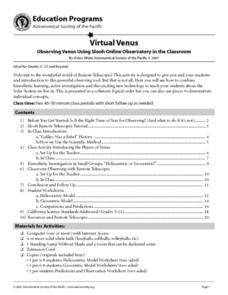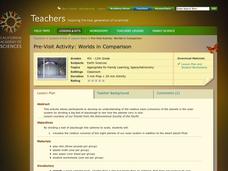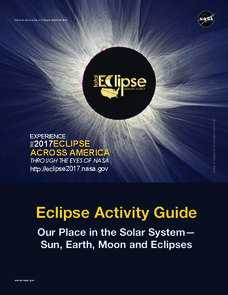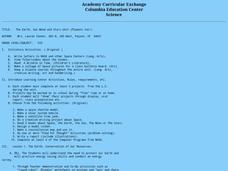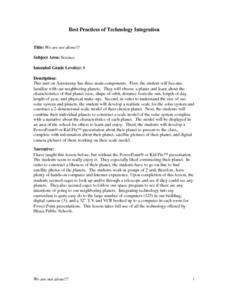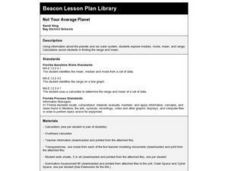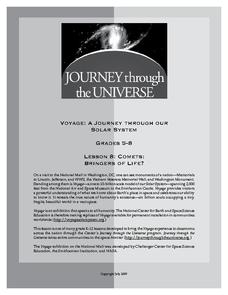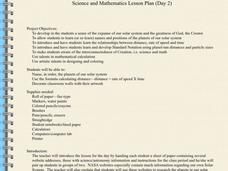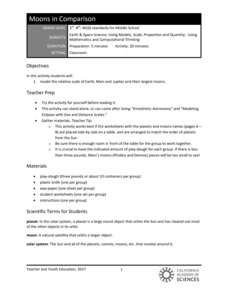Curated OER
Theories
Pupils view a series of videos that explore the development, formation and arguments for the geocentric model of the solar system. Studenst investigate the heliocentric model of the solar system and consider how scientific theories...
Curated OER
Our Place in Space
Third graders identify the different planets that make up the solar system. In this space science lesson, 3rd graders construct a scale model of the major planets. They explore their different unique features and dress up as planets.
Lawrence Hall of Science
DIY Sun Science
Get an up-close-and personal look at the sun from the safety of your classroom with this fun science application. Offering numerous activities, images, and videos, the resource supports children of all ages as they learn about the sun.
Curated OER
Virtual Venus
Students practice using the tool of remote telescopes in order to make observations in space. The lesson includes the best times of year to make observations. They use the internet to obtain information and to initiate the use of the...
Teach Engineering
Scale Model Project
Try your hand at scale models. Scholars create a scale model of an object using a scale factor of their choice. As part of the project, they give presentations on their processes and calculations. This is the last installment of the...
Curated OER
Lab Activity: Model of the Planets
This worksheet leads the class through the calculations needed to construct circles to represent the planets of our Solar System. The actual values are provided, as are suggested calculations to create the scale diameters. The ten...
Curated OER
Bringing the Solar System to Life
Students make models of the planets and use the models to show revolution of the planets around the sun. They explain the rotation of the planets after demonstrating with balloons.
Curated OER
Solar Systems Models Foldable Question Sheet
In this solar system worksheet, students use foldable models they made of the planets to answer questions about each planet. They answer questions about the theories and predictions made in our history about the solar system and answer...
Pacific Science Center
Worlds in Comparison
Young astronomers follow a step-by-step procedure for dividing a lump of dough into parts, resulting in a scaled volume set of puny planets. Along with the printable directions is a template chart of planet names on which learners can...
NASA
Eclipse Activity Guide
Ever made solar s'mores? Or recreated the solar system using peanuts? Astronomers young and old investigate all things solar using a variety of activities. Explore how the sun works, types of light it emits, and methods of charting the...
It's About Time
The Earth-Moon System
Explore the earth-moon system with blossoming astronomers in this fun-filled activity. They begin by investigating lunar phases and differentiating between each. They continue the activity by learning about tidal forces and how these are...
Chapman University
The Standard Model Poster
Chemistry classes will appreciate this color-coded, single-page reference sheet for The Standard Model of particle physics. It is divided into two main sections: elementary particles and compound particles, both with their antiparticles....
Curated OER
History of Our Solar System Time Line
Ninth graders explore the concept of ratios. In this ratio lesson, 9th graders construct a to scale time line that starts at the beginning of time. Students determine the correct placement of big events in time such as when the dinosaurs...
Curated OER
The Solar System: Go Green with the Sun!
Third graders learn how to use solar power. In this sun, technology and energy lesson, 3rd graders learn how the solar power from the sun can give off energy, learn about solar panels, discuss their uses and benefits, and design a solar...
Curated OER
Planets in Our Solar System
Fifth graders are introduced to the various planets, stars and moons in our solar system. Using photographs, they place the planets into the correct order from the sun. In groups, they research one planet, create a fact sheet and make...
Curated OER
The Earth, Sun, Moon, And Stars
Fifth graders explore the solar system. In this solar system unit, 5th graders investigate numerous projects while rotating through learning centers. Students write about space and construct a space shuttle model. Students practice map...
Curated OER
We Are Not Alone!!!
Eighth graders explore the area of astronomy. They explore Earth's neighboring planets. Students research a planet's characteristics. They develop a scale model of the solar system and a narrative about the planets.
Curated OER
You Are Here
Students determine the relative size and distance of the planets in the solar system. They use ratios in their mathematical calculations to make models of the planets after discussing the relative sizes of the planets. They keep a...
Curated OER
Not Your Average Planet
Fourth graders explore median, mode, mean, and range using information about the planets and our solar system.
Curated OER
Earth Rotation
Learners examine the rotation of the Earth as it occurs in the 24 hour cycle. They use models of planets and the globe to make observations of movements made. Students brainstorm prior knowledge and then participate in a demonstration of...
Journey Through the Universe
Comets: Bringers of Life?
Young scientists investigate the elements found in our solar system and then construct a model of a comet. They apply their new knowledge to the formation of the solar system.
Laboratory for Atmospheric and Space Physics
Planetary Distances on the Playground
There's no need to stay inside; get out of the classroom and create a scaled map of the solar system on your playground field! In collaborative groups, scholars identify the distance between the sun and other planets, place planet...
Curated OER
The Solar System
Students research the characteristics of planets in our solar system. In this space science lesson, students create a solar system model with each planet arranged according to their distance from the sun. They solve problems using the...
California Academy of Science
Moons in Comparison
Just how big is Earth's moon? With a hands-on simulation, scholars use Play-Doh to model the sizes of the planets Earth, Mars, Jupiter, and their moons. They make predictions as a class, work together to make their models, and discuss...





